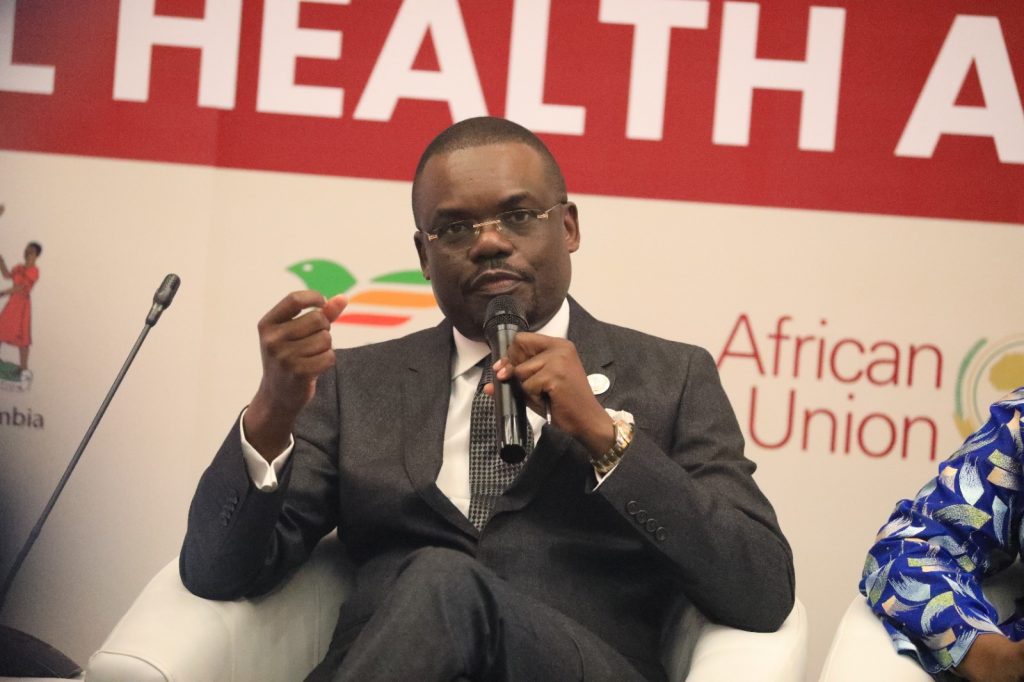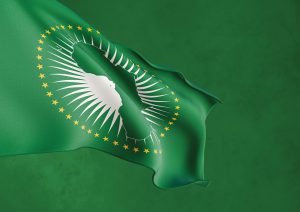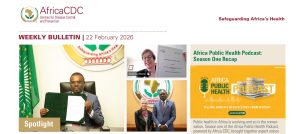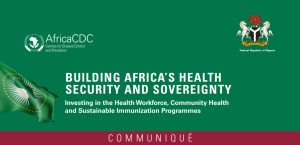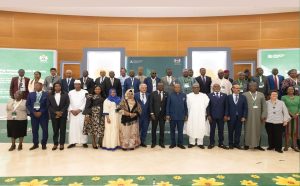H.E President Hakainde Hichilema, President of Zambia
H.E Saara Kuugongelwa-Amadhila, Prime Minister of the Republic of Namibia
Hon Sylvia Masebo, Minister of Health, Zambia
Dr Tedros Adhanom Ghebreyesus, Director-General, World Health Organization
Prof Margaret Gyapong, Director of the Institute of Health Research, University of Health and Allied Sciences (UHAS) and CPHIA 2023 Co-Chair
Distinguished Guests,Ladies and Gentlemen,
I stand before you today with a profound sense of honor and privilege as we gather for the 3rd International Conference on Public Health in Africa.
I would like to extend my heartfelt gratitude to our host, the Government of Zambia, who has been an excellent partner in shaping this year’s conference.
The theme of this year underscores a fundamental truth: that health is not only a matter of medical science but also of policy, equity, and global cooperation.
Breaking barriers requires us to think beyond the confines of traditional healthcare models. It beckons us to harness technology’s power, embrace equity and social justice principles, and foster robust collaborations that span borders and disciplines. It demands a concerted effort to amplify the voices of the most vulnerable among us.
It challenges us to look the barriers that have long impeded Africa’s progress in public health and calls upon us to redefine our position in the global health architecture. Together, we can break, and we will break the barriers that have hindered our progress for far too long and we can forge a new public health order for Africa—one that is resilient, equitable, and capable of meeting the challenges of the future.
This conference is significant, marking the eve of Africa CDC’s one-year anniversary as an autonomous institution of the African Union.
Africa CDC has established itself as the premium public health institution of the continent, guided by the visionary leadership of African Heads of State and government. Under this stewardship, Africa CDC has emerged as a beacon of hope and progress, working tirelessly to enhance the health and well-being of the African people. As we gather here today, we not only celebrate this remarkable milestone, but also recognize our Heads of State and Government for their remarkable leadership.
African leaders, including President Hichilema – here present, President Ramaphosa, President Ruto, and others, echoed the need for changes in the global financial architecture. This year’s theme challenges all of us to assess the long-standing barriers that have hindered Africa’s progress in public health. It urges us to reevaluate our stance within the global health architecture.
Under the guidance of His Excellency, H.E President Hichilema, who serves as our champion for Public Health Emergency Operations Centers, Africa CDC has made significant progress. The number of countries with functional PHEOCs will increase from 12 to 32.
His leadership serves as a remarkable model for all of us, and we find inspiration in his unwavering commitment and results-driven approach. As a testament to his exceptional leadership, the President has decided to allocate land and provide financial support for constructing the headquarters of the Africa CDC Southern Regional Coordinating Center.
Under the leadership of our African Heads of State and Government and with the backing of H.E Moussa Faki, the Chairperson of the African Union, I, in my role as the Director-General of Africa CDC, fully dedicated to the realisation of a New Public Health Order for Africa. This vison aims to redefine the healthcare landscape of our continent. It serves as our comprehensive plan for a new era, one where the well-being and prosperity of each and every African are safeguarded, preserved, and improved.
We aim to realise this bold vision and reshape the healthcare landscape of our continent through a strong emphasis on the 5Cs: Community, Connectivity, Capacity, Collaboration, and Climate.
FIRST, COMMUNITY:
Communities are the foundation upon which a healthier Africa will be built.
It is disturbing to note that 38 out of the 40 countries with the highest maternal mortality rates are in Africa.
This highlights the pressing need to strengthen the resilience of our communities. To achieve that, we need to manage the looming crisis with a huge gap of community health workers that Africa is facing. This gap may worsen if the existing community health workers continue to go unpaid and encounter a lack of standardisation.
Therefore, Africa CDC is promoting the agenda of 2 million paid and integrated Community Health Workers on the continent by 2030. This concerted initiative will place communities at the forefront of our efforts.
CLIMATE
On average, Africa has 2 new outbreaks per week, totalling more than 100 outbreaks per year. 75% of these outbreaks are zoonotic in origin and worsened by climate change.
As I speak, we have 18 countries affected by cholera with more than 4,000 deaths. We have multiple West African countries affected by dengue. The flooding in a number of countries including Libya, the earthquake in Morocco and a number of other natural disasters are showing the linkage of climate change and health in Africa.
According to the Africa Development Bank, the continent loses 5-15% of its GDP annually due to the impacts of climate change.
Therefore, Africa CDC is committed to supporting African countries to adopt a comprehensive One-health approach to tackle these climate-related challenges.
CONNECTIVITY
Inadequate connectivity in Africa is leading for under notification of outbreaks.
The rapid evolution of digital technology offers us an unprecedented opportunity to reshape the way we conduct our work.
By leveraging the digital advancements, including artificial intelligence, we can enhance our ability to detect emerging health threats, optimize resource allocation, and ultimately improve the well-being of our communities.
Connectivity will enable us to bridge geographical gaps and create a network of knowledge and information exchange. It will also empower us to address public health challenges with better efficiency and effectiveness.
CAPACITY
Less than 10% of African countries are able to respond to a major outbreak with skilled health workforce.
Africa requires 6,000 field epidemiologists, yet, we currently only have 1,900. Additionally, the continent needs 25,000 frontline epidemiologists, but we presently have just 5,000.
Africa CDC has introduced numerous programs and initiatives, such as Africa Volunteers Health Corps, Kofi Annan, and the Field Epidemiology Training Program, to bridge this gap.
The excessive dependence on imports for essential healthcare products is also a matter of grave concern. Less than 1% of vaccines, 5% of diagnostics and 30% of therapeutics used in Africa are currently manufactured in Africa. This imbalance underscores the urgent need to strengthen our medical manufacturing capabilities to enhance self-reliance and reduce vulnerability to supply disruptions.
Hence, Africa CDC is advocating for an ambitious agenda that aims to ensure that by 2040, a minimum of 60% of vaccines and medicines used in Africa are manufactured within the continent.
As I have to say it, local manufacturing is the 2nd independence of Africa, because it will mitigate our reliance on external sources, build our health security, promote local innovation, and lead for job creation, economic growth, peace and security.
COLLABORATION
Collaboration is the key driver of progress and innovation in all human endeavours. The level of collaboration we have achieved is made possible by the support of our communities, member states, donors, and diverse partners. We thank all of them.
Today, I’m delighted to announce a significant development in our partnership with the Mastercard Foundation, the “Saving Lives and Livelihoods”, where we are moving into Phase Two to better support countries to be well prepared for the next pandemic. This partnership, in its second phase will extend its reach and impact beyond immediate healthcare responses to cultivate a sustainable healthcare ecosystem and building capacity of Africa CDC.
It’s essential to recognize that no single entity, whether a government agency, healthcare provider, NGO, or academic institution, can effectively address the diverse challenges we confront in isolation. In our interconnected world, collaboration, where we pool our expertise and work collectively, is the linchpin for safeguarding and enhancing population health. Together, across different actors, sectors, and geographies, we can accomplish far more than in isolation.
Your Excellencies, ladies and gentlemen;
Over the weekend, we hosted the Youth Pre-Conference 2023, bringing together young minds and voices. As the First Lady of Namibia reminded us yesterday; the energy, vitality, and potential our young people bring to our continent are truly our most valuable asset. Beyond encouraging active participation, we believe the Youth Pre-Conference 2023 planted the seeds to propel Africa’s vibrant youth into key players in public health.
We are also deeply committed to advancing gender equity, viewing it as a foundational principle deeply ingrained in our mission. We firmly believe that gender equity isn’t solely a matter of social justice but is also a fundamental driver of prosperity and overall societal well-being. As a testament to our commitment, I pledge to actively work towards increasing the representation of women at decision-making tables, recognising the pivotal role they play in shaping our collective future.
Your Excellencies, ladies and gentlemen;
As I conclude my remarks, I sincerely thank you, Your Excellencies, for your extraordinary contributions to public health. Leadership is essential. It requires foresight, courage, and a profound sense of responsibility to prioritise the health and welfare of a nation’s people.
As we embark on this transformative journey, let us remember the words of Nelson Mandela, who once said, “It always seems impossible until it’s done.” Let this conference be the vessel where we transform the impossible into the achievable. Let it be the platform where we unite our collective knowledge, passion, and determination to chart a course towards a healthier, more equitable Africa.
In the coming days, I encourage each and every one of you to engage in thoughtful and spirited discussions, to challenge the status quo, and to forge innovative solutions that transcend boundaries. Let us leave no stone unturned in our quest to reposition Africa as a formidable force in the global health landscape. This is the spirit that guides us.

